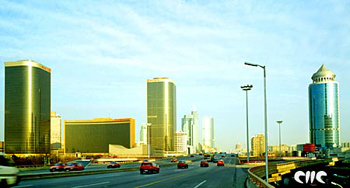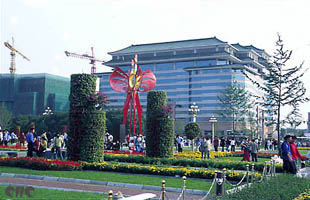The life in China's capital has undergone remarkable changes since the founding of China in 1949 and nowadays Beijingers have begun living "well-to-do" lives, as shown in a decline in the Engel's coefficient.
The Engel's coefficient (proportion of income that goes into food) in Beijing has dropped to 31.7 percent, indicating that the lifestyle of residents in both urban and rural areas of the China's capital has changed from being merely sufficiently fed and clothed, to comfortable, Han Nuansheng, spokesman of the Beijing Bureau of Statistics, said recently.
The Engel's coefficient is a major indicator of the people's living standard.
According to the measure set by the Food and Agricultural Organization of the United Nations, an Engel's coefficient above 59 percent represents absolutely poverty; 50-59 percent, barely enough food and clothing; 40-50 percent, a "moderately well-off" standard of living; 30-40 percent, a "well-to-do" standard of living; and below 30 percent, a "wealthy" life.
The lowered Engel's coefficient explained why the traditional greeting used by Beijingers -- "Have you eaten yet?" -- is being heard less and less now. Eating is taking up a smaller and smaller proportion of Beijing residents' awareness.

Statistics show that from 1978, when China initiated its reform and opening-up drive, to 2003, the per-capita disposable income of Beijing's urbanites increased from 365.4 yuan (US$44.02) to 13,882.6 yuan (US$1,672.6), 500 percent allowing for price fluctuations. Last year, farmers in the city's suburban area saw their per-capita pure income rise to 6,496.3 yuan (US$782.7), up 800 percent from the 1978 level. The Engel's coefficient for farmers has plunged from 62.9 percent in 1978 to 31.7 percent in 2003.
Another symbol for the improved living standard of Beijingers is the shift from a "kingdom of bicycles" to "a society of motor vehicle," Han Nuansheng said.
Last year, Beijing's population of private vehicles topped one million for the first time, including 656,000 private cars. Since the start of 2004, Beijing has sold 38,000 motor vehicles per month on average, including 27,000 new vehicles.
There are, of course, also low-income earners in Beijing, Han said. A social welfare system for low-income people was introduced in Beijing in 1997. Last year it benefited 161,000 people in the urban area, involving 340 million yuan (US$40.96 million) and 67,000 people in the suburban area, involving 36 million yuan (US$4.3 million).

(Xinhua News Agency October 8, 2004)

